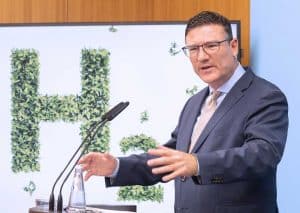
In summer, the German government published its national hydrogen strategy, drafted with input from several federal ministries. An example of this intergovernmental collaboration was education minister Anja Karliczek’s idea for creating the post of Green Hydrogen Innovation Commissioner, to ensure that the strategy’s ambitious aims lead to swift action, her ministry said. H2-international spoke with Stefan Kaufmann, who was appointed to the post, about his new job and his concrete plans for the industry. A lawyer by trade, and a member of the Christian Democrats, he has been in parliament since 2009, representing voters in Stuttgart South.
H2-international: Mr. Kaufmann, in June, the German government appointed you to the post of Green Hydrogen Innovation Commissioner. Could you tell us in a few words how you got the job?
Kaufmann: In its national hydrogen strategy, the government laid out ambitious targets that underline Germany’s role as an engine of innovation. The aim is to become the leading supplier of green hydrogen and the key market for trading the gas. Germany has strong research capabilities that are sure to give the sector a boost and facilitate the development of future-proof green hydrogen solutions. This is why the strategy says we need that post. My many years of experience in crafting research and innovation policies will help bring together leaders from academia, industry and the government to create commercial products out of project findings as fast as possible. That is also one of the main objectives of the new strategy.
How did you come to be innovation commissioner? Nothing on your resume seems to suggest deep knowledge of the energy market, let alone hydrogen.
Research and innovation are, you could say, the lifeblood of my political career. I have always been curious about what the future holds for us. After I won my district in 2009, I joined the parliament’s research committee. Since then, I have gained years of experience and many connections throughout the innovation community. So I was delighted when Ms. Karliczek offered me the job and, of course, I accepted. Hydrogen provides us with a unique chance to promote German ingenuity and grow our economy. The same is true all across Europe, which is why the gas has played a key role under Germany’s EU presidency.
Three times in a row, you won your seat outright instead of being picked from a party list. As for Stuttgart, the city is heavily dependent on revenues from the auto industry. What would you say has changed in the past years? Were fuel cells a factor in deciding on the right strategy for the transportation sector?
Automotive and machinery manufacturing are major economic drivers in Baden-Württemberg. The state is also home to a whole host of excellent education and research facilities, four of Germany’s 11 elite universities among them. In short, Baden-Württemberg offers the perfect environment for ensuring the success of a hydrogen economy. Right now, German automakers place little emphasis on manufacturing fuel cell models, while their competitors in Japan are several years ahead.
What do you believe German automakers should have done? Have they waited too long to come up with electric vehicle designs?
The auto industry is facing great challenges. As Germany’s Green Hydrogen Innovation Commissioner, I want the country to have a lead on the fuel cell competition and I welcome support from anyone who shares that goal.
Are batteries or hydrogen the more sensible choice to power vehicles?
Green hydrogen is a valuable resource, with great short-term prospects in heavy-duty, maritime and railroad transportation.
But what do you say to those German automakers, including Stuttgart-based Daimler, which – for years – happily took the incentives offered for fuel cell RD&D but have yet to deliver market-ready FCEVs? Not to mention that although Daimler previously signed a jobs guarantee, management is reportedly thinking about using a loophole to let go thousands of employees in Stuttgart. When you won your seat, you said your aim for the next four years was to make sure the Stuttgart region would continue to provide employment opportunities and prosperity and that new industries would create jobs and innovative products. The exact opposite has happened.
Compared to the rest of Germany, very few people living in Stuttgart are unemployed, and we intend to keep it that way. As for fuel cells, German automakers, including companies based in the southwest, are indeed losing to the competition. As someone who was born in the Stuttgart region, I want to ensure that the state can provide the best possible solutions nationwide. It pains me to see that others have raced past us in the meantime. Unfortunately, over the last several years, both Stuttgart’s mayor from the Greens and the state’s Green Party government have missed opportunity after opportunity to fund innovation and develop proactive economic and industrial policies. As an example, Stuttgart’s council did not even submit a bid when Baden-Württemberg was looking for a site to test autonomous vehicles.
Let us talk about your new job. What were you asked to do exactly?
My responsibilities are set out in the national strategy. The main task is to bring together leaders from academia, industry and the government to make sure that clever ideas quickly grow into successful, innovative products. Plus, I am a member of the federal departments‘ joint hydrogen committee and the National Hydrogen Council, a group of researchers and industrial representatives advising the government.
…
read more in H2-international October 2020


























0 Comments